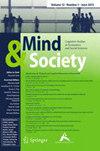School Psychology: A Positive Psychology Approach
Q1 Arts and Humanities
引用次数: 0
Abstract
The ultimate goal of schools is to educate young people to become responsible, critically thinking citizens who can succeed in life. Understanding the factors that stimulate them to become active agents in their own learning is critical. Positive psychology is a relatively new field of psychology.Positive psychology can be used to unravel factors that facilitate a student’s sense of agency and active school engagement. Positive psychology is an emerging applied science that is just beginning to have a significant impact on schools and school-based interventions. Positive psychology is also used in school-based interventions from the point of view of public health. Interventions are given to students at different levels based on their individual needs. An inordinate number of students report high levels of boredom, anger, and stress in schools. This scenario often leads to their disengagement from critical learning and school development. Positive psychology has gained immense popularity within many areas of the behavioural sciences, including applied psychology. Most of the interest in positive psychology, however, has been disproportionately focused on adults. (Diener & Diener, 2009). Child development and the structures that support that development have received less attention within positive psychology. The attributes of interest to positive psychologists are Optimism, Hope, Creativity, Self-Efficacy, Virtues of various types like Forgiveness and Gratitude, and Subjective Well-being are likely to begin in childhood. It is, therefore, imperative that childhood and those organisations that are most pertinent to the developing child-family, child, peers, and school—be of high interest to positive psychologists. The development of a child is facilitated by primary group and secondary group socialization processes.学校心理学:一种积极心理学方法
学校的最终目标是教育年轻人成为负责任的、具有批判性思维的公民,从而在生活中取得成功。了解刺激他们成为自己学习的积极主体的因素是至关重要的。积极心理学是一个相对较新的心理学领域。积极心理学可以用来揭示促进学生的代理感和积极的学校参与的因素。积极心理学是一门新兴的应用科学,它刚刚开始对学校和基于学校的干预产生重大影响。从公共卫生的角度来看,积极心理学也被用于校本干预。根据学生的个人需要,对不同层次的学生进行干预。相当多的学生报告说,他们在学校里感到极度无聊、愤怒和压力。这种情况往往导致他们脱离批判性学习和学校发展。积极心理学在包括应用心理学在内的许多行为科学领域都获得了极大的普及。然而,对积极心理学的大部分兴趣都不成比例地集中在成年人身上。(Diener & Diener, 2009)。在积极心理学中,儿童发展和支持这种发展的结构受到的关注较少。积极心理学家感兴趣的属性是乐观,希望,创造力,自我效能,各种类型的美德,如宽恕和感激,以及主观幸福感,这些都可能从童年开始。因此,积极心理学家必须对童年和那些与儿童发展最相关的组织——家庭、孩子、同伴和学校——高度感兴趣。儿童的发展是由初级群体和次级群体社会化过程促进的。
本文章由计算机程序翻译,如有差异,请以英文原文为准。
求助全文
约1分钟内获得全文
求助全文
来源期刊

Mind and Society
Arts and Humanities-Philosophy
CiteScore
2.30
自引率
0.00%
发文量
5
期刊介绍:
Mind & Society is a journal for ideas, explorations, investigations and discussions on the interaction between the human mind and the societal environments. Scholars from all fields of inquiry who entertain and examine various aspects of these interactions are warmly invited to submit their work. The journal welcomes case studies, theoretical analysis and modeling, data analysis and reports (quantitative and qualitative) that can offer insight into existing frameworks or offer views and reason for the promise of new directions for the study of interaction between the mind and the society. The potential contributors are particularly encouraged to carefully consider the impact of their work on societal functions in private and public sectors, and to dedicate part of their discussion to an explicit clarification of such, existing or potential, implications.Officially cited as: Mind Soc
 求助内容:
求助内容: 应助结果提醒方式:
应助结果提醒方式:


